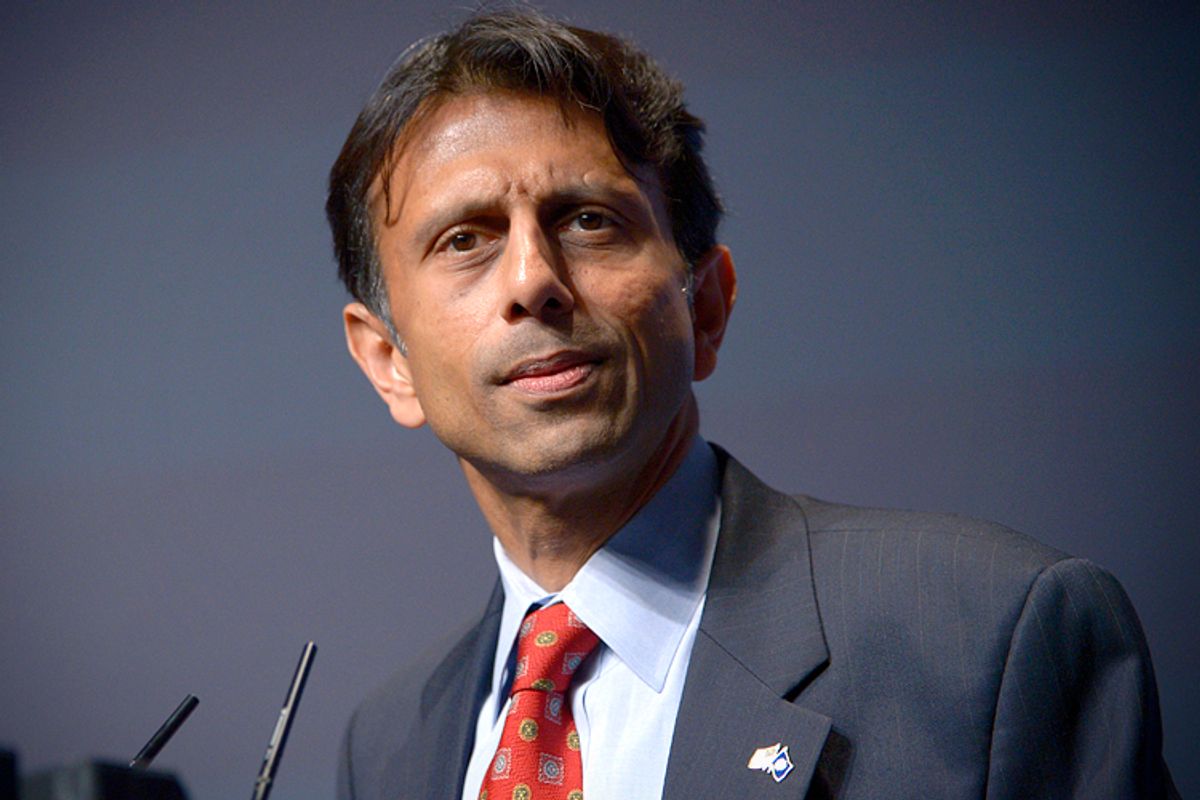Jonathan Martin wrote a primer this weekend on why many nervous Democrats won’t take President Obama’s advice – or mine -- and run on the Affordable Care Act in the 2014 midterms. To me, it seems like a chicken and egg problem: Vulnerable Democrats won’t run on the ACA because key groups of voters don’t like it. But why should voters like it if even Democrats won’t defend it?
But there is one ACA issue where Republicans seem to be on the defensive, and that’s on the question of Medicaid expansion. Even Georgia Democratic Senate candidate Michelle Nunn and gubernatorial candidate Jason Carter, who have been wishy-washy on the law, support Medicaid expansion – and that’s partly because polls show 59 percent of Georgians support it too. Gov. Nathan Deal has tried to pass the decision off to the state Legislature, which is widely seen as an effort to pass the buck. Kansas Sen. Sam Brownback just managed to do the same thing, on Friday signing a bill that gave the Republican-dominated Legislature the power to decide on Medicaid expansion – but they won’t meet again until 2015.
In Florida, newly minted Democrat Charlie Crist is hitting Gov. Rick Scott hard for his refusal to accept Medicaid funding. Much like in Georgia, 58 percent of Florida voters want to see their state take the federal funds. Crist leads Scott in the latest polling.
And Republican Senate candidates Scott Brown of New Hampshire (it seems wrong not to write Massachusetts, Scott), Tom Cotton of Arkansas and Terri Lynn Land of Michigan have all refused to take a stand on Medicaid expansion, which might make them the biggest cowards of all.
In Louisiana, Democrats are trying to bypass Gov. Bobby Jindal and let state voters decide whether to accept $16 billion in expanded federal Medicaid funding, to cover 242,000 newly eligible Louisianans. The federal funding would create 15,600 new healthcare jobs, according to Families USA. Vulnerable Democratic Sen. Mary Landrieu has been hitting Jindal hard on the issue, and the New Orleans Times-Picayune just called on the state Legislature to back the referendum notion, blaming Jindal’s presidential ambitions for his decision to turn down the funds. Even conservatives, the paper suggested (perhaps with a little sarcasm), ought to back an effort to give voters a say on the matter. What are they afraid of? Well, the Koch-funded Americans for Prosperity, for one thing, which has promised to campaign against Republicans who support Medicaid expansion.
Still, we know what Democrats are afraid of, at least in red states. Martin’s piece laid out some of the math. There’s a huge racial divide: In a December New York Times/CBS News poll, 41 percent of white voters said the ACA would hurt them while only 17 percent said it would help; those numbers were essentially flipped among African-Americans. You’d think that might help Democrats in Georgia, where 30 percent of registered voters are black. But because black turnout tends to fall at least 5 points in midterm elections from the presidential-year level, Nunn and Carter are wary about embracing the ACA as a whole, not just Medicaid expansion.
But there’s that chicken-and-egg problem again: Maybe black voter turnout wouldn’t fall as much if white Democrats weren’t so wishy-washy about Obama’s signature achievement?
David Axelrod says one problem is that unlike Medicare and Social Security, the ACA “is viewed more as a social welfare program than a social insurance program, but that’s not right because it is social insurance.” Axelrod means well, but there are two problems with his analysis. First, opponents hit Medicare and Social Security as welfare programs, too, back when they were being debated, and neither was immediately popular; Democrats had to defend and expand them. Two, the actual "welfare" portion of the ACA, Medicaid expansion, is actually pretty popular, according to polling even in red states. In Virginia, where Gov. Terry McAuliffe is working hard for expansion, even 55 percent of Republicans back Medicaid expansion.
National Democrats, especially, need to stop equivocating about the benefits of the law. Republicans will try to "welfarize" it, to use Brian Beutler's term; that's what they do. Democrats who run away from it are letting Republicans define it, and they probably won't get away from it, anyway.

Shares